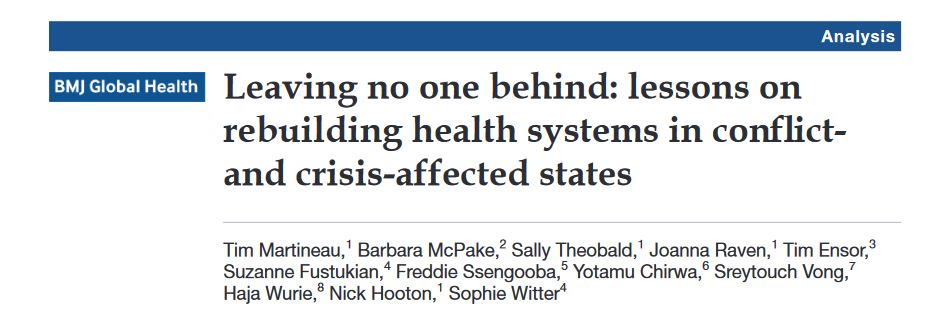
Leaving no one behind: lessons on rebuilding health systems in conflict and crisis-affected states
Tim Martineau, Barbara McPake, Sally Theobald, Joanna Raven, Tim Ensor, Suzanne Fustukian, Freddie Ssengooba, Yotamu Chirwa, Sreytouch Vong, Haja Wurie, Nick Hooton, Sophie Witter
BMJ Global Health Jul 2017, 2 (2) e000327; DOI: 10.1136/bmjgh-2017-000327
Fragile and conflict-affected states have some of the worst health indicators and weakest health systems globally, causing major health impacts on billions of people, and huge challenges in progress towards universal health coverage (UHC). This paper draws on the breadth of ReBUILD’s research during its first phase which sought to understand key issues inhibiting health systems strengthening in these settings and how these could be addressed. It describes three major themes which have emerged from an analysis of this work, and which will inform policy makers and practitioners in their work to develop sustainable health systems in post-conflict and post-crisis contexts.
You can access the full paper here.
Abstract
Conflict and fragility are increasing in many areas of the world. This context has been referred to as the ‘new normal’ and affects a billion people. Fragile and conflict-affected states have the worst health indicators and the weakest health systems. This presents a major challenge to achieving universal health coverage. The evidence base for strengthening health systems in these contexts is very weak and hampered by limited research capacity, challenges relating to insecurity and apparent low prioritisation of this area of research by funders. This article reports on findings from a multi-country consortium examining health systems rebuilding post conflict/crisis in Sierra Leone, Zimbabwe, northern Uganda and Cambodia. Across the ReBUILD consortium’s interdisciplinary research programme, three cross-cutting themes have emerged through our analytic process: communities, human resources for health and institutions. Understanding the impact of conflict/crisis on the intersecting inequalities faced by households and communities is essential for developing responsive health policies. Health workers demonstrate resilience in conflict/crisis, yet need to be supported post conflict/crisis with appropriate policies related to deployment and incentives that ensure a fair balance across sectors and geographical distribution. Post-conflict/crisis contexts are characterised by an influx of multiple players and efforts to support coordination and build strong responsive national and local institutions are critical. The ReBUILD evidence base is starting to fill important knowledge gaps, but further research is needed to support policy makers and practitioners to develop sustainable health systems, without which disadvantaged communities in post-conflict and post-crisis contexts will be left behind in efforts to promote universal health coverage.